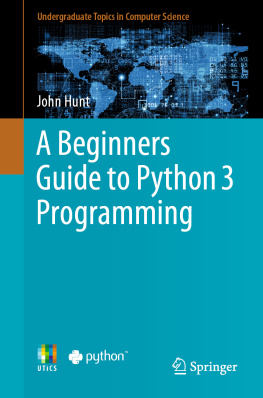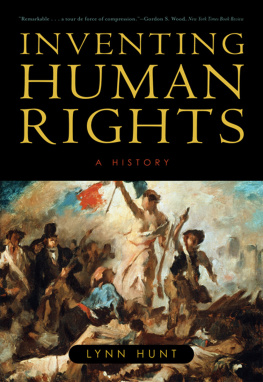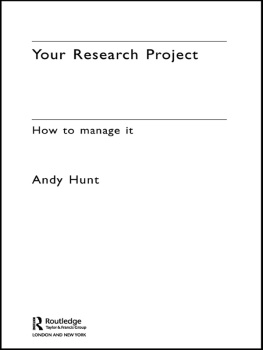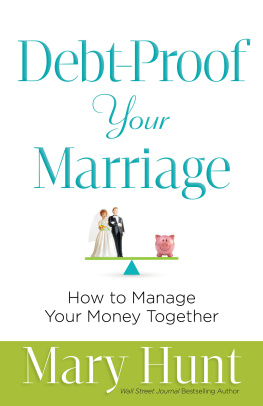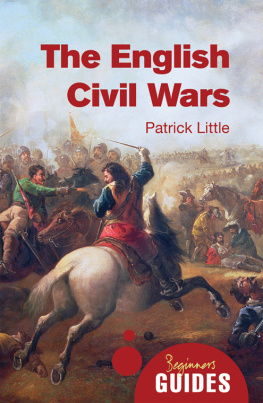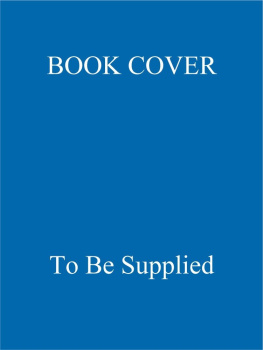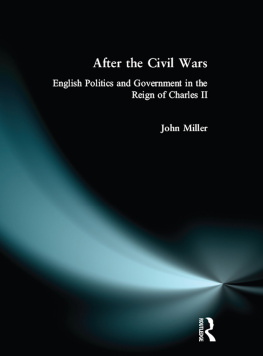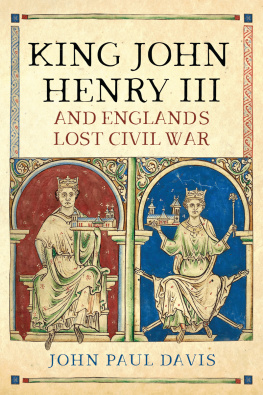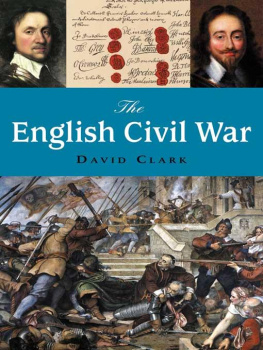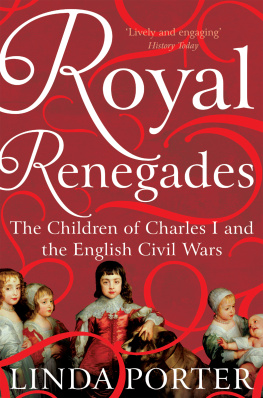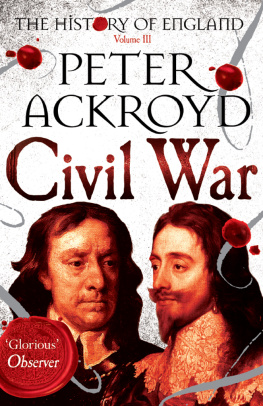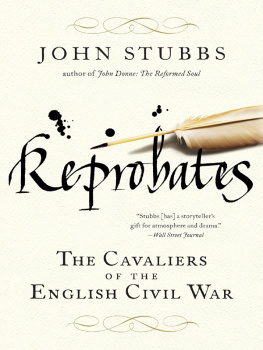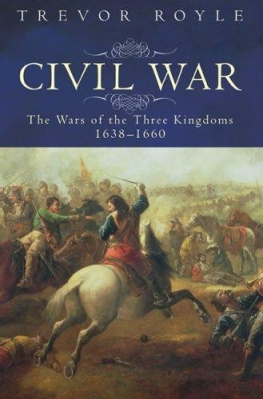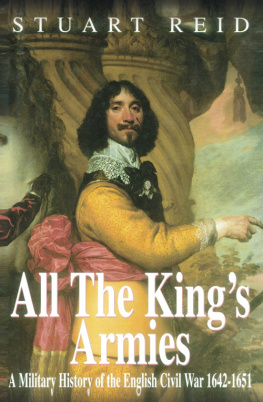Tristram Hunt is one of Britains best known young historians. Educated at Cambridge and Chicago Universities, he is lecturer in British history at Queen Mary, University of London and author of Building Jerusalem: The Rise and Fall of the Victorian City and The Frock-Coated Communist: The Revolutionary Life of Friedrich Engels. A leading historical broadcaster, he has authored numerous series for BBC radio and television and Channel 4. He is also a regular contributor to The Times, the Guardian and the Observer.
THE ENGLISH CIVIL WAR
At First Hand
TRISTRAM HUNT

PENGUIN BOOKS
PENGUIN BOOKS
Published by the Penguin Group
Penguin Books Ltd, 80 Strand, London WC2R 0RL , England
Penguin Group (USA) Inc., 375 Hudson Street, New York, New York 10014, USA
Penguin Group (Canada), 90 Eglinton Avenue East, Suite 700, Toronto, Ontario, Canada M4P 2Y3
(a division of Pearson Penguin Canada Inc.)
Penguin Ireland, 25 St Stephens Green, Dublin 2, Ireland (a division of Penguin Books Ltd)
Penguin Group (Australia), 250 Camberwell Road, Camberwell, Victoria 3124, Australia
(a division of Pearson Australia Group Pty Ltd)
Penguin Books India Pvt Ltd, 11 Community Centre, Panchsheel Park, New Delhi 110 017, India
Penguin Group (NZ), 67 Apollo Drive, Rosedale, North Shore 0632, New Zealand
(a division of Pearson New Zealand Ltd)
Penguin Books (South Africa) (Pty) Ltd, 24 Sturdee Avenue, Rosebank, Johannesburg 2196, South Africa
Penguin Books Ltd, Registered Offices: 80 Strand, London WC2R 0RL , England
www.penguin.com
First published in Great Britain by Weidenfeld & Nicolson 2002
Published in Penguin Books 2011
Copyright Tristram Hunt, 2002
All rights reserved
The moral right of the author has been asserted
Picture credit abbreviations:
BAL Bridgeman Art Library
BL British Library
NPG National Portrait Gallery
WA Weidenfeld Archive
Except in the United States of America, this book is sold subject to the condition that it shall not, by way of trade or otherwise, be lent, re-sold, hired out, or otherwise circulated without the publishers prior consent in any form of binding or cover other than that in which it is published and without a similar condition including this condition being imposed on the subsequent purchaser
ISBN: 978-0-14-196281-8
The Lord hath done such things amongst us as have not been known in the world these thousand years
OLIVER CROMWELL , 27 January 1654
Acknowledgements
I would like to thank Anthony Cheetham for suggesting the idea for this book and my editors Michele Hutchison and Ion Trewin for making it happen so calmly. At Weidenfeld and Nicolson, Roisin Heycock, Laura Searle, Alex Knights and Victoria Webb were invaluable in marshalling the vast array of documents. For his help in discovering the more obscure texts of the period and for his excellent knowledge of mid-seventeenth century literature and religious heterodoxy, my thanks to Simon Dyton. And for his intricate grasp of seventeenth-century portraiture and iconography, Tom Graves. I would also like to thank my agent, Georgina Capel; Alan Clements at WarkClements for re-igniting my interest in the war of the three kingdoms; Professor John Morrill, University of Cambridge; Professor Blair Worden, University of Sussex; Susan and Richard Griffin; the staff of the Rare Books Room, Cambridge Library; and the Centre for History and Economics, Kings College, Cambridge.
Contents
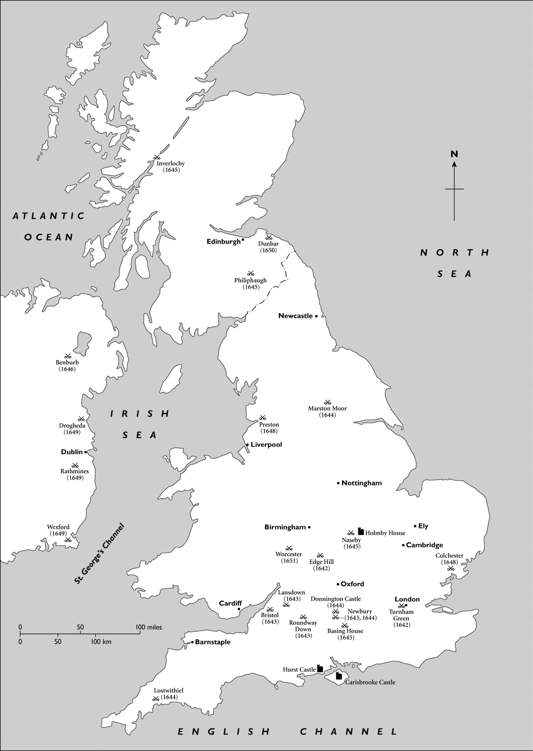
Introduction
The land is weary of our discords, being thereby polluted with our blood.
God has given you great successes in many places against our enemies, and sometimes he is pleased to give our enemies successes against us; in all of them, whether of the one or the other party, the poor English are still sufferers.
Whose goods, I pray sir, are plundered? Whose houses are burnt? Whose limbs are cut or shot off? Whose persons are thrown into loathsome dungeons? Whose blood stains the walls of our towns and defiles our land?
Is it not all English? And is it not then time for us, who are all Englishmen, to be weary of these discords, and to use our utmost endeavours to put an end to them?
I know, sir, you are all here of the same opinion with me in this point; and that it was an unhappy mistake of those who told us in the beginning of our warfare, that it would be only to show ourselves in the field with a few forces, and then all would be presently ended.
We have found it otherwise: let us now again seek to recover these blessings of peace, whereof we are told, that nihil tam populare quam pax, that nothing is than peace more gracious to be heard of, more pleasing to be desired, and more profitable to be enjoyed.
So lamented the parliamentarian Bulstrode Whitelocke in a speech to the House of Commons. As early as 1643, he could already sense the terrifying chaos awaiting his countrymen. The civil wars of the 1640s, known historically as the English Civil War, ripped apart England, Ireland and Scotland. Institutions, hierarchies and the very fabric of society were transformed by the most dramatic decade in British history. When King Charles I raised his Royal Standard in August 1642 and declared war against Parliament, he unleashed a revolution. The civil war years would see a king executed, the establishment of a republic, the digging of communes in Surrey, the abolition of the House of Lords, a torrent of religious freethinking, and the creation of a military dictatorship. All on English soil. Meanwhile Ireland would suffer subjugation and sectarian bloodshed while Scotland erupted into brutal clan conflict. By the conclusion of the wars in 1651, the British Isles had become a foreign land. New ideas about political liberty and religious toleration, the balance of power between King and Parliament, the justice of private property, and the function of the Church of England had melted away the old belief systems. In the process the country became a vast battlefield: 30,000-strong armies laying waste the country; tortuous sieges gutting medieval towns and country houses; and staggering displays of military bravura that have secured the names of Edgehill, Marston Moor, and Dunbar their place in British history.
This revolutionary epoch came with a terrible human cost. Almost a quarter of a million people lost their lives in a conflict unrivalled for proportionate British casualties until the carnage of World War One. The grim horror of civil war divided families and communities. The country went to war over the rights of parliament against the unfettered power of the monarch as well as the future direction of the Church of England. Such seemingly esoteric issues set father against son and forced brother into battle against brother. The competing pull of King and Parliament, Anglican and Puritan scythed through old loyalties and traditional ties. During some nine years of fighting, no corner of the British Isles, no town or village, escaped the gruesome burden of war.
The devastation of those years affected rich and poor, Cavalier and Roundhead alike. In a predominantly rural economy, the chaos of huge armies on the march, working sons press-ganged into combat, and soldiers arbitrarily billeted in houses and farms destroyed the precarious living of millions. Harvests were left to rot, property plundered and generations of work sent up in the flames of war. It was a terrible, bloody time a warning of the dangers when politics collapse, ideology flares and religious zealotry possesses a people. While few understood the wars roots or reasons, all had to endure the exhaustive search for its resolution.



